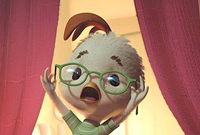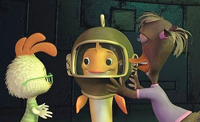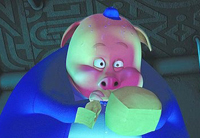My seven-year-old son, Benjamin, says Chicken Little is the best movie he’s ever seen. (He says this about every movie he genuinely likes, so we know he genuinely likes Chicken Little.) He also says it’s a little bit scary, but mostly funny. By “a little bit scary” he means, “There was a part where I hid my face in my mom’s arm and asked if we could leave, but I got over it.” We may translate “mostly funny” as “I laughed out loud lots of times and even snorted once or twice.”

There are a few other things you should probably know about Chicken Little. It is not a sequel to Chicken Run; it has nothing to do with that stop-motion animation hit from Aardman Animations (the same studio behind Wallace & Gromit: The Curse of the Were-Rabbit). It is, in fact, a Disney movie—the very first Disney feature created in-house with 3-D computer animation (rather than traditional 2-D, which Disney has mastered for decades).
Chicken Little is essentially Disney’s bid to compete with 3-D standard bearers Pixar (Toy Story 1 & 2, Finding Nemo, The Incredibles) and DreamWorks (the Shreks). (Pixar, in fact, has been distributing its films under the Disney name, but that partnership could be on the brink of dissolving, leaving Disney to fend for itself in the 3-D genre.) Time—and sales of movie tickets and Happy Meal toys—will tell if the House of Mouse has orchestrated a successful coup. What’s more important to the average parent trying to decide whether to drop $60 on a family visit to the cineplex is whether Chicken Little is a good movie. Benjamin says “yes.” His mom says “sort of.”

The film’s basic premise comes from the old Chicken Little fable, and it opens with a frenetic scene in which the Little Chicken himself—a spunky but misunderstood preteen of teeny proportions—is hit on the head by a piece of sky, and naturally, sounds the town’s alarm. (Chicken Little is voiced by Scrub‘s Zach Braff, who is plucky and pathetic in all the right places—but I found it confusing to hear an adult voice coming from the young protagonist. Of course, true verisimilitude would require that an actual chicken voice the lead character, so I suppose age is a minor quibble.) When the dust settles and no evidence of fallen firmament can be found, Chicken Little quickly and infamously becomes the town’s laughingstock. His single (presumably widowed) dad, Buck Cluck (voiced with great befuddled bluster by Garry Marshall), tries to smooth things over, but his obvious embarrassment at the whole incident creates a gulf between father and son. Chicken Little is desperate to earn the approval of both his dad and his generally boorish classmates, but his luck gets worse the harder he tries, and he bounces from one humiliating scenario to another, losing his knickers and his pride in the process.
Fortunately, our little hero has a band of misfit buddies at his side. Runt of the Litter (Steve Zahn) is rotund even for a pig, but he loves Streisand and old disco tunes even more than corn. Fish Out of Water (glubbed by film editor Dan Molina) attends school in a diving helmet worn to keep water in and communicates via elaborate pantomime sequences that provide some of the film’s funniest moments. Abby Mallard (the always effective Joan Cusack) is a teen-magazine-reading wannabe-therapist with an obvious crush on Chicken Little. When the school gym teacher divides the kids into two teams—Popular and Unpopular—Chicken Little and all his buddies are destined for the losing side. But at least they have each other.

Chicken Little’s fortunes finally change when he manages, through a miraculous series of silly events, to score the winning run in a baseball championship of epic importance to the townsfolk. Father and son are reconnected, peer acceptance is extended, and all is well—until the sky falls once again, and Chicken Little realizes he is the only one who can save the planet from alien invasion. The film careens recklessly from this point on into a confusing but amusing (and, for younger kids, scary) spoof of War of the Worlds.
Chicken Little has a fun, hyper-realized cartoonish look—more Roger Rabbit than Nemo—and director Mark Dindal (The Emperor’s New Groove) manages to throw in some neat new tricks. Unfortunately, the story is not nearly as innovative as the animation. To get back to the original question—is Chicken Little a good movie?—the most accurate answer might be to say it’s a pastiche of several good (and not so good) movies. Runt of the Litter’s karaoke loving pig gives us the surprise of a sensitive, even effeminate soul in a big, tough package, but it was funnier the first time with Shark Tale‘s Lenny. Chicken Little‘s aliens are oddly reminiscent of the invaders Jimmy Neutron, Boy Genius faced more than four years ago. And the “let’s be candid about school politics” dialogue that pops up now and again (a baseball play-by-play commentator reminds the crowd that it’s not just about the victory, it’s about the gloating) is genuinely funny, but it’s not substantially different from anything a particularly good episode of Recess can offer.

Granted, in this media-saturated culture, finding anything new under the sun must be a nearly impossible challenge. But, failing innovation, a little story cohesion would be good. Chicken Little moves at a frantic, scattershot pace, and, rather than creating and then trusting in the power of a narrative arc, the screenwriters act like the party loudmouth who vainly tries to cover his insecurity with a flurry of jokes. The film is a hodgepodge of available devices—pop-culture references, lowbrow humor, a whole assortment of underdog cliché s, and, whenever it gets really stuck, music. Happy songs. Sad songs. New stuff for the kids (Barenaked Ladies and Five for Fighting). Old stuff for the grown-ups (Bee Gees and Diana Ross). It’s all diverting and amusing, but there’s nothing enduring here.
Chicken Little is, of course, a cartoon, and as such, it should be silly and slapstick and scattershot. But it seems also to have ambitions to be something more than a cartoon—something more like what Pixar would do. There are some flashes of greatness in the film (especially toward the end) that hint at what Chicken Little could have been if there had just been a bit more thought behind all the mayhem. If my own son’s reaction is any indication, Chicken Little should be entertaining enough to bring in the kind of box office that will give Disney some of its old swagger back. Let’s hope they take some of that confidence and place it in a good, old-fashioned story—the fourth dimension every 3-D feature needs to be a classic.
Talk About It
Discussion starters
- Chicken Little’s dad had a hard time letting his son know that his love was unconditional. If you’re a parent, do you think your own kids feel they have to earn your love? Do you feel you have to earn your parents’ love?
- What is one thing you’ve never expressed to your own mother or father that you wish you could? Is there an opportunity to do so now?
- In Chicken Little the planet is almost annihilated over a misunderstanding. Have you been in a situation where people misunderstood each other’s intentions? What did it take (or would it take) to resolve the situation?
The Family Corner
For parents to consider
For a G-rated movie that seems to tout the importance of unconditional love and acceptance, Chicken Little uses bullying and cruelty for laughs surprisingly often, with kids routinely calling each other “losers.” There is some tame bodily-function humor. Some children 8 and under may find the alien invasion scenes frightening, and kids under 5 or 6 almost certainly will. There is a nice storyline involving father/son reconciliation that does affirm the importance of familial love.
Photos © Copyright Walt Disney Pictures
What Other Critics Are Saying
compiled by Jeffrey Overstreet
from Film Forum, 11/10/05
In their first attempt to compete with Pixar and DreamWorks as a studio producing feature-length, computer-animated films, Walt Disney Pictures hoped to lay an egg—a golden egg—with Chicken Little.
There’s good news and bad news for the “Mouse House.” The good news: The film earned more at the box office than any of Disney’s traditionally animated films since The Lion King. The bad news: It didn’t earn nearly as much as the latest animated projects from Pixar and DreamWorks.
The New York Times was among many sources ridiculing the poor bird, calling the movie “a hectic, uninspired pastiche of catchphrases and clichés, with very little wit, inspiration or originality to bring its frantically moving images to genuine life. Not to be Chicken Littleish about it, but our children deserve better. … Chicken Little joins Shark Tale, Robots and Madagascar as the latest evidence that technical novelty is a cheap—or, rather, a very expensive—substitute for good storytelling and memorable characters.”
Christian press critics weren’t terribly impressed either.
Matt Mungle (The Phantom Tollbooth) says Chicken Little “resembles a straight to video project or extended Saturday morning cartoon rather than a major release. And that is a shame because it had potential, but just never took flight. The relationship between Little and his dad is a little too deep for younger viewers and not sellable for adults. You will get the point of course but they never drive it home in a way that is relevant or thought provoking.”
David DiCerto (Catholic News Service) notes the film’s slogan—”The end is near”—and comments, “If the movie is any indication of things to come, that just might be true for Disney’s storied reign as the gold standard of animated entertainment. … Sadly for the mouse house, this Chicken is a bit of a turkey.”
Steven Isaac (Plugged In) notes the lessons of the original childrens’ tale: “Don’t overreact and jump to conclusions … and don’t spread rumors.” That’s different from the lessons of the film, he notes, which are about “believing in your kids and courageously facing the future.” He says the film is “much more appropriate for the middle school set than it is for grade schoolers. There’s enough madness and mayhem here—not to mention that whole sky-really-is-falling thing—to make me want to warn parents and teachers not to jump right in with all of the kiddies.”
Lisa Rice (Crosswalk) says, “Though Chicken Little provides a great opportunity for family discussion about communication, trust, and unconditional love, its mix of heavy themes and alien chases should categorize it as ‘wait for video.'”
Mainstream critics are not very pleased.











